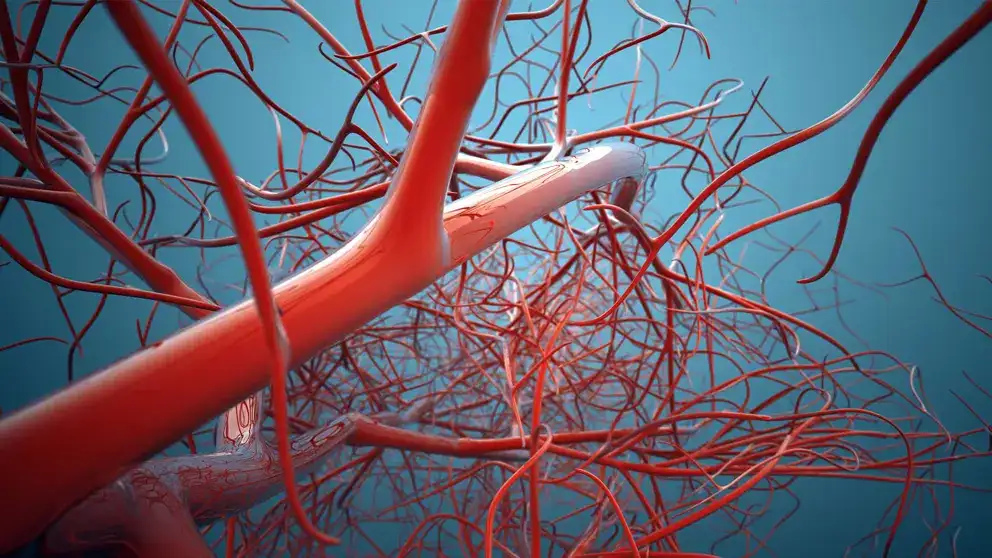Research on COVID-19 has revealed it’s not just a respiratory disease, but a vascular one too. In fact, that term — vascular — keeps coming up when experts talk about a range of illnesses that involve heart disease and stroke.
So, what do people mean when they talk about the vascular system? And how does it connect to the novel coronavirus that causes COVID-19?
“The vascular system supplies blood, nutrients and oxygen to the entirety of the human body,” explains Dr. Michelle Bendeck, a Heart & Stroke-funded researcher in the Ted Rogers Centre for Heart Research and professor at the University of Toronto. The vascular system is all the arteries and veins from the biggest artery, the aorta, right down to the tiny capillaries.
Jonah Burke-Kleinman, a student in the Bendeck lab, compares this system to the plumbing in your house. The vascular system is really one big organ, and it can be healthy or unwell just like any other organ in your body.
Healthy vessels
When it’s healthy, the vascular system works in coordination with nerves, muscles and even hormones to move blood efficiently. “In a healthy system, blood flows smoothly, and not under high pressure,” says Dr. Richard H. Swartz , stroke neurologist and Heart & Stroke-funded researcher at Sunnybrook Health Sciences Centre who specializes in stroke research and treatment.

The starting point for problems is injury to the endothelial layer.
Importantly, when the endothelium, which is the lining of the blood vessels, is damaged, it has a domino effect on the entire system. That can cause the vessel walls to stop expanding and contracting smoothly, leading to high blood pressure or reducing blood flow to vital organs. “The starting point for problems is injury to the endothelial layer,” says Dr. Bendeck.
Inflammation, injury or other problems can cause the vascular system to either get clogged up, or become leaky — yes, just like pipes.
In atherosclerosis, the endothelium gets sticky and builds up plaque. That can lead to a clot causing a heart attack or a stroke. Similarly, in peripheral artery disease (PAD), the arteries in the legs or arms develop plaque.
These plaques can tear or rupture. If that happens in the brain, it causes a stroke; if it’s an artery that feeds the heart muscle, the result is a heart attack.
“Some diseases of the vascular system cause heart attacks and strokes. People know about the end results, but most people don’t realize that the blood vessels are at the root of it all. Even when clots come from elsewhere (e.g. the heart in atrial fibrillation), they travel through the vessels,” says Dr. Swartz.
What COVID-19 does
When people with COVID-19 started getting strokes and heart attacks, scientists began researching the connection. They soon realized that the virus was attacking not just the respiratory system, but the vascular system as well.
There’s a good reason why: this novel coronavirus attaches itself to the human body via receptors called ACE-2. “Those ACE-2 receptors are quite prevalent in a lot of places in the body, especially the endothelium layer of the arteries and veins,” says Dr. Swartz. “The virus can get in there and inflame the blood vessels.”
This inflammation causes both clogs and leaks, triggering heart events and strokes.
Since the vascular system supplies oxygen to the brain, and since even tiny changes can impact brain function, Dr. Swartz wonders if COVID-19 might affect cognition, including memory and thinking. He’s helped launch an online brain function study that is recruiting people who have active infection or have recovered from the virus; enrol online here.
Protecting yourself
Because of the vascular connection with COVID-19, people with existing heart disease, a previous stroke, or those with risk factors such as high blood pressure should consider themselves high risk for complications.
It remains important to get vaccinated, avoid risky situations and wear a mask in crowded situations.
- Learn more about COVID, heart disease and stroke.

